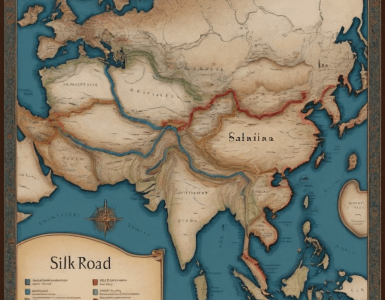Ever wondered why we do the things we do? Why we celebrate certain holidays, eat specific foods, or even gesture in particular ways? Often, the answers lie buried deep within history, revealing surprising connections between seemingly disparate cultures and events. It’s a fascinating game of historical connect-the-dots, unveiling unexpected links that spice up our understanding of the world around us. ¿Cómo construyeron las pirámides los antiguos egipcios?
El curioso caso del tenedor
For instance, take the humble fork. We barely think twice about it, but its adoption in Europe was a surprisingly slow and contested process. For centuries, knives and spoons reigned supreme. The fork, originating in the Byzantine Empire (and possibly even earlier in ancient Egypt!), was initially viewed with suspicion. Some saw it as an effeminate tool, others as a sign of excessive luxury and even a threat to the established social order. Its rise to prominence was intricately linked to the Italian Renaissance and the spread of refined table manners among the upper classes. It’s a testament to how a simple utensil can be a microcosm of broader social and cultural shifts.
Potatoes: From the Andes to the Irish Famine
Another fascinating example? Potatoes. This unassuming tuber, native to the Andes Mountains, completely revolutionized European diets and demographics starting in the 16th century. The potato’s high caloric density and resilience made it a staple food across the continent, particularly in Ireland. Ironically, this very dependence on a single crop eventually led to a devastating catastrophe – the Irish Potato Famine of the 1840s. The reliance on a single, disease-susceptible crop magnified the impact of a blight, forever changing the course of Irish history and highlighting the unpredictable consequences of cultural and agricultural choices.
Tea, Trade, and the Opium Wars
The story of tea is equally dramatic. The British Empire’s insatiable thirst for Chinese tea fuelled a global trade network, creating vast wealth but also generating significant geopolitical tensions. The East India Company’s attempts to balance the trade deficit between Britain and China led to the infamous Opium Wars of the 19th century – a brutal conflict fueled by the addictive properties of opium, showcasing the dark side of cultural exchange and economic ambition. This shows how seemingly innocuous cultural practices can become entangled in larger power struggles with far-reaching global consequences.
The Unexpected Legacy of Genghis Khan
Stepping outside the realm of food and drink, consider the impact of Genghis Khan and the Mongol Empire. While notorious for brutality and conquest, the vast Mongol empire inadvertently facilitated trade and cultural exchange along the Silk Road. This unprecedented level of interconnectedness, despite its violent origins, led to the spread of ideas, technologies, and even diseases across Eurasia, shaping the trajectory of multiple societies for centuries to come. The Mongol peace, for all its flaws, shows how even chaotic historical periods can have unexpected and lasting ripples.
A surprisingly connected world
The examples are endless. The spread of Islam brought with it advancements in mathematics and astronomy. The printing press revolutionized the spread of knowledge, leading to the Renaissance and the Scientific Revolution. The Columbian Exchange, while bringing prosperity to some, also resulted in the devastating spread of disease to indigenous populations in the Americas. Each historical event, no matter how seemingly isolated, left an indelible mark on cultures around the globe, intricately weaving a complex tapestry of influence and interaction.
Odd facts and little-known origins
Let’s delve into some oddities: Did you know that the tradition of hanging stockings at Christmas is linked to the legend of Saint Nicholas secretly leaving gifts for children in their stockings? Or that the ubiquitous playing card suits of hearts, diamonds, clubs, and spades have their origins in medieval European symbols? Or that the seemingly innocuous act of raising a glass in a toast has its roots in ancient Roman practices aimed at warding off poisons?
These seemingly small customs hold within them the echoes of long-forgotten practices and beliefs, connecting us to a rich history of rituals and symbolism. They are a reminder that even the most familiar aspects of our daily lives are deeply intertwined with historical events and cultural traditions.
The power of perspective
Exploring history and culture through such connections allows us to appreciate the complex relationships between events and traditions. We can start to see the seemingly random elements of our lives as pieces of a much larger and more intricate puzzle. It encourages a deeper understanding of the world around us, fostering a more nuanced and informed perspective.
By unraveling these hidden handshakes between history and culture, we gain a richer understanding of ourselves, our societies, and the global community we inhabit. It’s a testament to the interconnectedness of humanity and the lasting impact of events and traditions, past and present, near and far.

























Añadir un comentario